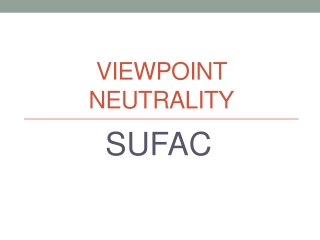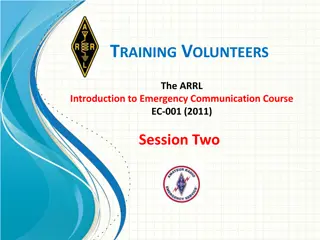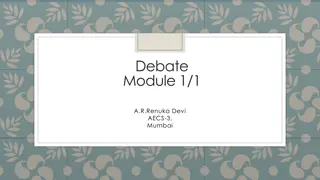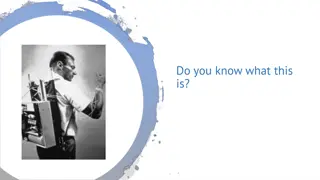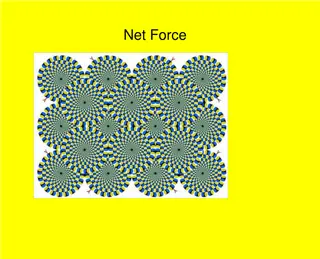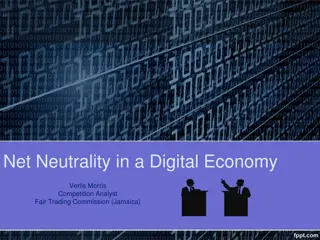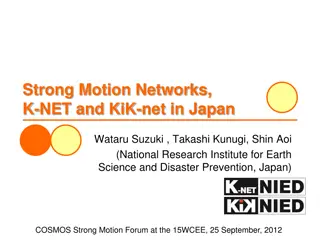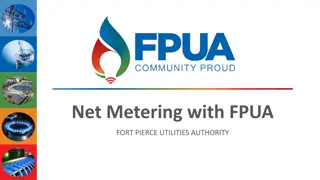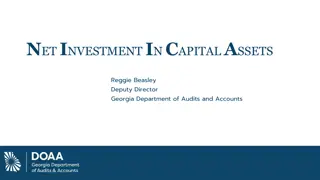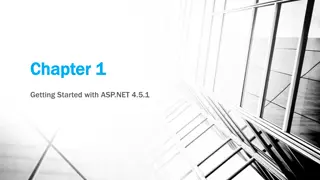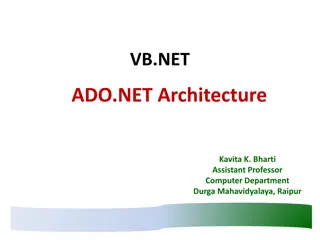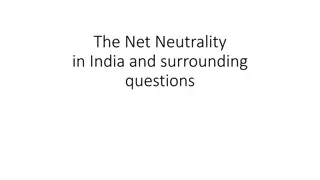Understanding Net Neutrality: Perspectives and Debates
Net Neutrality is the principle that Internet Service Providers (ISPs) should treat all Internet communications equally, without discrimination based on user, content, or source. Various actors hold different perspectives on this principle, with arguments for and against its implementation. Proponents emphasize equal access and innovation opportunities, while opponents cite investment concerns and the need for regulatory flexibility. Understanding these perspectives is crucial in shaping the future of Internet governance.
Download Presentation

Please find below an Image/Link to download the presentation.
The content on the website is provided AS IS for your information and personal use only. It may not be sold, licensed, or shared on other websites without obtaining consent from the author. Download presentation by click this link. If you encounter any issues during the download, it is possible that the publisher has removed the file from their server.
E N D
Presentation Transcript
Net Neutrality COMP3220 Web Infrastructure Dr Heather Packer hp3@ecs.soton.ac.uk
Summary Net Neutrality is the principle that Internet Service Providers (ISPs) must treat all Internet communications equally, and not discriminate or charge differently based on user, content, website, platform, application, type of equipment, source address, destination address, or method of communication. Easley et al. Easley, R., Guo, H., Kr mer, J. - From Net Neutrality to Data Neutrality, Information Systems Research 29(2):253 272 3
Summary Actors Infrastructure services, mobile phone and network companies Big industry, publishing companies, tech companies Individual content creators Content consumers Different actors have different perspectives on Net Neutrality Actors from the same sector can have different views Net Neutrality is a simple principle however it s complicated because people s opinions and motivations 4
For Net Neutrality For Accessibility Argument Access to the Internet and the Web is considered a human right An open, public system consisting of privately owned components Maintaining a standardization for internet data transmission is essential for growth The web we see today benefited from an open internet Should provide equal access for start ups and big companies ISPs should not become gatekeepers of the internet Push their service vs a competitors Control access to certain sources of information Pay for speech ISP should not control what the internet is used for No discrimination for types of the data Protect content and content providers Promotes competition amongst content providers Experimentation Free Speech Unbiased Choice Innovation and Creativity Supports innovation and new businesses 5
Against Net Neutrality Against Argument Provide investment for infrastructure improving accessibility for all Internet Infrastructure is not free Government are increasingly requiring internet access for all; affordable, rural coverage Need to expand the internet but in an affordable way Net Neutrality limits the options ISPs have to raises funds Profits will go to share holders To support privacy in case law Stop illegal content through blocking domains Not open, but brings positive change by providing access to useful information Regulation Increases the quality Bringing internet to 3rdworld countries Anti-competitive Poor connectivity and cheap non-smart phone devices ISPs are competing with each other to provide better and cheaper services They need to find competitive elements to do this ISPs need freedom to operate in different ways Net neutrality might stifle network innovation and can kill competition 6
Opinion Have you experienced net neutrality? Are you pro or against net neutrality and why? Does Net Neutrality promote innovation? Does Net Bias promote innovation? 7
Net Neutrality Misunderstanding Watch https://www.youtube.com/watch?v=Ttl4 7rss9Rk Net neutrality proponents accept that data types should be treated differently BUT ISPs should not be treating data with the same type differently No preferential treatment for one video streaming company https://www.youtube.com/watch?v=Ttl47rss9Rk 8
BBC Utopian View 2040 It s a summer morning in 2040. The internet is all around you and all the things that you re about to do during your day will fall into place thanks to the data streams flying across the internet. Public transport to the city dynamically adjusts schedules and routes to account for delays. Buying your kids the perfect birthday presents is easy because their data tells your shopping service exactly what they will want. Best of all, you re alive despite a near-fatal accident last month because doctors in the hospital s emergency department had easy access to your medical history. This is the ideal vision of the web Helps save lives and makes day to day decisions easier because of information https://www.bbc.com/future/article/20141015-will-we-fear-tomorrows-internet 9
BBC Dystopian View 2040 It s a winter evening in 2040 and the world is a darker place. The internet is teeming with cybercrime and it s become impossible to go online without making your bank account vulnerable or risking identity theft. Trolls have taken over social networking, the web is ludicrously priced and segmented, meaning only the rich can access the most useful and up-to-date resources. If that wasn t bad enough, in some countries people s every move is constantly monitored by secret police using networked sensors and internet communications. Even if you can get online, would you want to? Can you identify the themes that relate to net neutrality? Is this scenario likely? https://www.bbc.com/future/article/20141015-will-we-fear-tomorrows-internet 10
Predictions of Losing NN Very small sample of opinion Most likely Content will be blocked Content will be slow and throttled Small businesses will struggle to compete Least likely Speeds will get faster Customers can pay for better service Rural internet access will get worse ISP pick winners and losers More innovation for internet of things More data collection, less privacy Restrictive data caps More broadband investment https://qz.com/1158328/what-will-happen-now-that-net-neutrality-is-gone-we-asked-the-experts/ 11
Fragmented Web The Internet or "the Internets"? Ian Peter, a pioneer Internet rights activist thinks that the Internet will cease to be just one entity. He wrote: 'The Internet will fragment. Global connectivity will continue to exist, but through a series of separate channels controlled by a series of separate protocols. Our use of separate channels for separate applications will be necessitated by security problems, cyber policy of nations and corporations, and our continued attempts to find better ways to do things. https://www.salon.com/2014/03/12/dystopian_doom_or_global_village_what_the_internet_will_look_like_in_2025/ 12
Fragmented Web? There are lots of paid for tv streaming services Netflix Now tv Disney Amazon etc To watch your favourite shows you must subscribe and pay for multiple services Imagine that you had to subscribe and pay for multiple services on the web, how would it effect the content you consumed? 13
Dystopian Future - https://wayforward.archive.org/ia2046/ Go to https://wayforward.archive.org/ia2046/ Explore the fictional timeline, click on the event for more detail What is Section 230? Is this timeline far fetched? How likely do you think that other overlay networks would be used in place of the www in this scenario? If Section 230 is defunct do you think there would there be a divide in the functionality of the www US vs the rest of the world? 14
Tech Companies What are the arguments for a tech company to supporting Net Neutrality? What are the arguments for a tech company not to supporting Net Neutrality? 15
Academia What are the arguments for a university to supporting Net Neutrality? What are the arguments for a university not to supporting Net Neutrality? 16
You What are the most important arguments for you to supporting Net Neutrality? What are the most important arguments for you not to supporting Net Neutrality? 17


